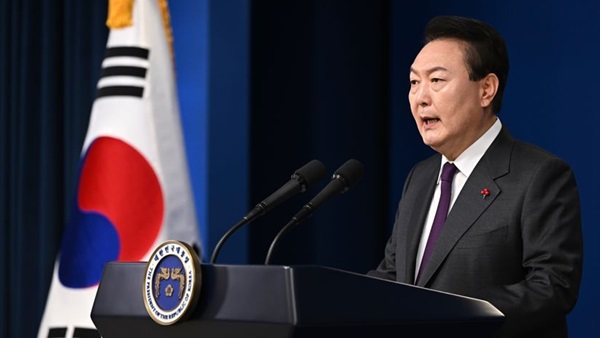South Korea-U.S. Military Drills Could Use Nuclear Assets, President Yoon Suk-yeol Says

South Korea’s president said the country is discussing
conducting joint exercises with the U.S. using nuclear assets, although
President Biden played down the claim.
Yoon Suk-yeol told a South Korean newspaper that the aim of
the drills would be to practice the implementation of extended deterrence.
South Korea doesn’t have its own nuclear weapons, but is protected under what
is known as the U.S. nuclear umbrella.
“The nuclear weapons
belong to the United States, but planning, information sharing, exercises and
training should be jointly conducted by South Korea and the United States,” Mr.
Yoon said in an interview with Chosun Ilbo published on Monday. He said
Washington is “quite positive” about the idea.
Asked by reporters whether he is discussing joint nuclear
exercises with South Korea, President Biden replied, “No.” A spokeswoman for
South Korea’s presidential office maintained that the U.S. and South Korea are
in talks over sharing information and conducting joint exercises involving U.S.
nuclear assets. She said President Biden specifically denied “joint nuclear
exercises”—a term used for exercises involving more than one nuclear power.
Tensions have risen in recent months on the Korean Peninsula
as the North has accelerated its weapons testing and Mr. Yoon has pledged a
tougher stance on Pyongyang’s provocations since he took office in May.
North Korea conducted a record number of missile launches
last year, including intercontinental ballistic missiles and submarine-launched
missiles. Of the more than 270 missile launches by the country since 1984, more
than a quarter came in 2022, according to the Center for Strategic and
International Studies, a Washington-based think tank.
The regime is showing no signs of letting up. Last week,
North Korea flew five drones over South Korean territory, prompting Seoul to
scramble jet fighters and conduct aerial-defense drills. Pyongyang tested a
short-range ballistic missile on Jan. 1. In a speech published in state media
that day, North Korean leader Kim Jong Un pledged to increase his nuclear
arsenal exponentially and emphasized that the weapons could be used for
offensive purposes.
Mr. Kim said the country would develop a new ICBM system
capable of carrying out a quick nuclear counterstrike. Pyongyang recently
tested a solid-fueled rocket engine, which would help it deploy its long-range
missiles more quickly.
Meanwhile, the U.S. and South Korea have resumed large
military drills after they were scaled back under the two countries’ previous
administrations. Washington and Seoul have also strengthened trilateral
cooperation with Japan, which has said it planned to raise military spending in
an effort to counter the rising threats from China and North Korea.
Mr. Kim has accused Washington and Seoul of increasing
pressure on Pyongyang to the maximum. In his speech published Sunday, he said
hostile forces were “isolating and stifling” North Korea, calling it
“unprecedented in human history.”
North Korea’s advances in its nuclear and missile programs
have renewed debate in South Korea about nuclear armament.
In his interview with the South Korean newspaper, Mr. Yoon
said that Washington was uncomfortable with the concept of nuclear sharing,
which allows countries without nuclear weapons to participate in the planning
of nuclear-weapons use, but added that joint exercises based on shared
information would be as good as nuclear sharing. Mr. Yoon told the newspaper
the U.S. nuclear umbrella isn’t enough to reassure South Koreans in the face of
North Korea’s threat.
South Korea pursuing such joint exercises will ratchet up
tensions drastically on the Korean Peninsula as Pyongyang perceives any
military drills as pretext for further escalation, said Hong Min, a senior
fellow at the Korea Institute for National Unification, a state-funded think
tank in Seoul.
The Biden administration has said it remains open to talks
with North Korea but Pyongyang hasn’t engaged in negotiations. South Korea has
also offered humanitarian aid and economic assistance to North Korea but
Pyongyang hasn’t responded to the outreach.
Mr. Yoon said he was open to an inter-Korean summit aimed at
reducing tensions, and emphasized it was crucial to resume dialogue on
humanitarian issues first. “The people are a little fed up with summits that
are just for show,” he said.







